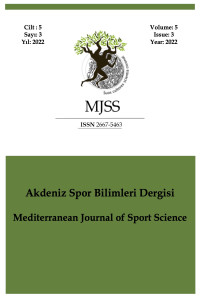Öz
Bu çalışma üniversitede öğrenim gören öğrencilerin fanatizm düzeyleri ile marka tercihleri arasındaki ilişkiyi incelemek amacıyla gerçekleştirilmiştir. Bu doğrultuda; çalışma grubuna, Kayseri ilinde bulunan Erciyes Üniversitesi ve Kayseri Üniversitesi’nden rastgele seçilmiş ve farklı bölümlerde eğitimlerini sürdüren 696 öğrenci gönüllü olarak katılım göstermiştir. Araştırmada veri toplama aracı olarak; fanatizm düzeylerine yönelik verileri elde etmek için Taşmektepligil, Çankaya ve Tunç (2014) tarafından geliştirilen “Futbol Taraftarı Fanatiklik Ölçeği”, marka sadakatine yönelik verileri elde etmek için ise; Tekin (2020) tarafından geliştirilen “Marka Sadakati” ölçeği ayrıca araştırmacı tarafından oluşturulan “Kişisel Bilgi Formu” kullanılmıştır. Ölçeklerden elde edilen veriler SPSS paket programı ile analiz edilmiştir. Katılımcılara ait kişisel bilgiler ve envanter toplam puanları ve faktör puanları frekans (f) ve yüzde (%) değerleri tespit edilerek verilmiştir. Verilerin normallik dağılımları çarpıklık basıklık testleri ve Kolmogrov Smirnov Testi ile sınanmıştır. Verilerin, iki değişken arasında karşılaştırılmasında t testi, üç veya daha fazla değişkenin karşılaştırılmasında ise anova testi uygulanmıştır. Ölçeklerden elde edilen puanlar arasındaki ilişkiyi gösterebilmek için Pearson Momentler Çarpımı Korelasyon analizi (r) kullanılmıştır. Araştırma bulguları incelendiğinde, öğrencilerin fanatiklik düzeyleri ile marka sadakati arasında pozitif yönde anlamlı bir ilişki bulunmuştur. Özellikle fanatiklik anlamında kurumsal aidiyeti yüksek öğrencilerin takımla özdeşleşme konusunda pozitif uyum içerisinde oldukları görülmüştür. Sonuç olarak araştırma neticesinde ortaya çıkan verilere göre, futbol taraftarı fanatikliği ile marka sadakati arasında bütün alt boyutlarda pozitif bir ilişki görülmektedir. Futbol taraftarlarının kurumsal aidiyetleri ile takımla özdeşleşme durumları arasında yüksek derecede pozitif bir ilişki ortaya çıkmıştır. Takıma aidiyet duygusu besleyen taraftarların takımlarıyla daha çok bütünleştikleri ve bu duruma paralel olarak destekledikleri kulüplere katkı sağlayabilmek adına satın alma düşüncelerinde de pozitif yönde bir artış olduğu düşünülmektedir.
Anahtar Kelimeler
Beden Eğitimi ve Spor Fanatizm Fanatik Marka Tercihi Marka Sadakati
Kaynakça
- Referans 1 Açak, M., Düz, S., Karataş. Ö., Karademir, T., Kurak, K. ve Bayer, R. (2018).Türkiye futbol federasyonu 1.ligindeki taraftarların fanatiklik durumlarının incelenmesi. Atatürk Üniversitesi Beden Eğitimi ve Spor Bilimleri Dergisi, 20(3), 8-23.
- Referans 2 Aktuğlu, I.K. ve Temel, A. (2006). Tüketiciler markaları nasıl tercih ediyor? (Kamu sektörü çalışanlarının giysi markalarını tercihini etkileyen faktörlere yönelik bir araştırma). Selçuk Üniversitesi Sosyal Bilimler Enstitüsü Dergisi, 15(15), 43-59.
Investigation of the Relationship Between University Students' Fanaticism Levels and Brand Preferences
Öz
This study was carried out to examine the relationship between university students' levels of fanaticism and brand preferences. In this direction; 696 students who were randomly selected from Erciyes University and Kayseri University in Kayseri and continuing their education in different departments voluntarily participated in the study group. As a data collection tool in the research; “Football Fans Fanaticism Scale” developed by Taşüstüpligil, Çankaya and Tunç (2014) to obtain data on fanaticism levels, and to obtain data on brand loyalty; The "Brand Loyalty" scale developed by Tekin (2020) was also used, and the "Personal Information Form" created by the researcher. The data obtained from the scales were analyzed with the SPSS package program. The personal information of the participants and the total scores of the inventory and factor scores were given by determining the frequency (f) and percentage (%) values. The normality distributions of the data were tested with the skewness and kurtosis tests and the Kolmogrov Smirnov Test. The t test was used to compare the data between two variables, and the anova test was used to compare three or more variables. Pearson Product Moments Correlation analysis (r) was used to show the relationship between the scores obtained from the scales. When the research findings were examined, a positive and significant relationship was found between students' levels of fanaticism and brand loyalty. It has been observed that students with high institutional belonging, especially in terms of fanaticism, are in positive harmony in identifying with the team. As a result, according to the data obtained as a result of the research, there is a positive relationship between football fan fanaticism and brand loyalty in all sub-dimensions. A highly positive relationship has emerged between the corporate belonging of football fans and their identification with the team. It is thought that the fans, who have a sense of belonging to the team, integrate more with their teams and in parallel with this situation, there is a positive increase in purchasing thoughts in order to contribute to the clubs they support.
Anahtar Kelimeler
Physical Education and Sports Fanaticism Fanatic Brand Preference Brand Loyalty
Kaynakça
- Referans 1 Açak, M., Düz, S., Karataş. Ö., Karademir, T., Kurak, K. ve Bayer, R. (2018).Türkiye futbol federasyonu 1.ligindeki taraftarların fanatiklik durumlarının incelenmesi. Atatürk Üniversitesi Beden Eğitimi ve Spor Bilimleri Dergisi, 20(3), 8-23.
- Referans 2 Aktuğlu, I.K. ve Temel, A. (2006). Tüketiciler markaları nasıl tercih ediyor? (Kamu sektörü çalışanlarının giysi markalarını tercihini etkileyen faktörlere yönelik bir araştırma). Selçuk Üniversitesi Sosyal Bilimler Enstitüsü Dergisi, 15(15), 43-59.
Ayrıntılar
| Birincil Dil | Türkçe |
|---|---|
| Konular | Egzersiz ve Spor Bilimleri |
| Bölüm | Arşiv |
| Yazarlar | |
| Yayımlanma Tarihi | 28 Eylül 2022 |
| Gönderilme Tarihi | 26 Temmuz 2022 |
| Kabul Tarihi | 27 Ağustos 2022 |
| Yayımlandığı Sayı | Yıl 2022 Cilt: 5 Sayı: 3 |
Cited By
FUTBOL SÜPER LİG TAKIM TARAFTARLARINDA FANATİZM DÜZEYİ İLE NARSİSİZM VE TEMEL PSİKOLOJİK İHTİYAÇ DOYUMU ARASINDAKİ İLİŞKİLER
Journal of Global Sport and Education Research
https://doi.org/10.55142/jogser.1458044
Fanatizmin Lisanslı Ürün Satın Alma Niyeti Üzerindeki Etkisi ve Marka Sadakatinin Aracı Rolü
Ahi Evran Üniversitesi Sosyal Bilimler Enstitüsü Dergisi
https://doi.org/10.31592/aeusbed.1354868
Fanatizm, Ahlak ve Utanma Duygusunun Lisansli ve Taklit Kulüp Ürünleri Satın Alma Niyeti Üzerine Etkisi: Kulüp Taraftarları Üzerine Bir Araştırma
Dumlupınar Üniversitesi Sosyal Bilimler Dergisi
https://doi.org/10.51290/dpusbe.1389902
Mediterranean Journal of Sport Science (MJSS) is licensed under a Creative Commons Attribution 4.0 International License CC BY-NC 4.0 .


